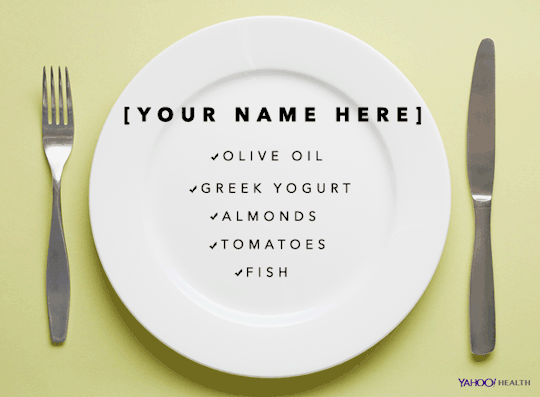4 Expert Tips to Create the Perfect Healthy-Eating Plan For You

(Photo: Yahoo Health/Getty Images)
By Maggie Callahan
If your New Year’s diet isn’t delivering the weight loss or vitality you had been banking on, it’s time to get personal. With a personalized diet, that is.
It turns out that our dietary requirements are as unique and varied as human hair colors and facial features. During a recent study, Israeli scientists monitored participants’ blood glucose levels and saw that two people’s bodies reacted very differently after the exact same meal.
Dr. Frank Lipman, a functional medicine doctor and founder of the high profile Eleven Eleven Wellness Center in New York City, said that differences in genes, lifestyles, and imbalances in the microbiome – think gut bacteria and their buddies – can cause two people to digest and assimilate foods very differently.
This means that no matter how closely you follow the latest fad diet you might not see any results. Instead, it’s to find the ideal diet for you. While no diet can change your make up and turn you into an Olympic sprinter or give you Tom Brady’s body, a host of benefits comes when you embrace your body’s unique needs.
Related: Learn How The Success of This Man’s Diet Can’t Be Quantified In How Many Pounds He Lost
“When we find the diet that works best for us and take out the foods that impact us negatively, our digestion improves, we feel increased energy, and troublesome symptoms such as unexplained weight gain, brain fog, puffiness, and joint pain are reduced or alleviated,” said Lipman, who uses an individualized approach with each of his patients.
Ready to reap all of these benefits? Here are some expert tips in finding the perfect (INSERT YOUR NAME HERE) eating protocol:
LISTEN TO YOUR BODY
To get on track with your plan, heed your body’s messages. Do you ignore the indigestion after a meal rather than trying to figure out what caused it? It’s time to follow your body’s clues.
Lipman said to start with getting enough sleep, staying hydrated, eating whole foods, and managing stress.
“When you are exhausted and running on adrenaline or continually constipated or nursing a hangover, you are not able to focus on much more than getting through the day,” he said. “The benefits of taking care of your health are enormous and we all deserve to feel our best.”
ADDRESS FOOD SENSITIVITIES
You have to get rid of the culprits before the good foods can do their jobs. This means kicking to the curb all foods that give you trouble.
“Since so many people experience some level of digestive distress, it seems more like a fact of life to most of us, rather than a symptom of an underlying problem,” Lipman said. “Many of my patients say, ‘Yes, I have gas and bloating, but that is normal, right?'”
Emily Lindner, MD, a functional medicine practitioner in Chicago, said that digestive symptoms need to be dealt with at the source rather than taking an over-the-counter Band-Aid.
“Having to take an antacid implies that there is chronic inflammation, and chronic inflammation is what leads to cancer,” she said. “You want to support the body, not block it.”
Look out for digestive symptoms like gas, bloating, reflux, constipation, or diarrhea; skin manifestations, such as rash, eczema, acne; or fatigue, headaches and/or dark circles under the eyes.
Related: Biohacking Can Help You Understand How Your Body Reacts To Food And Exercise
“Less obvious, but not infrequent, symptoms include poor or disturbed sleep, moodiness, and anxiety,” Lipman said.
Gluten-containing foods, dairy products, eggs, and nightshade vegetables top the list of the most common food culprits, Lipman said. Nightshades include tomatoes, eggplant, peppers, and potatoes.
He also said to avoid sugar, refined grains like white flour, hydrogenated oils, other junk foods, and GMO crops, such as soy and corn, because these foods often contribute to inflammation, blood sugar dysregulation and digestive symptoms.
If you’re having trouble pinpointing your problem foods, a food journal, documenting symptoms and what you’ve eaten, can help.
SUPPORT YOUR MICROBIOME
Those little microbes in your gut have much more of an impact on your health than just keeping you regular. When you find the proper diet that lets your microbial communities flourish, everything about your health benefits.
“The microbial community in our bodies is absolutely critical for maintaining optimum function and is crucial for digesting food, supporting your immune system, powering your metabolism, and maintaining a healthy weight,” Lipman said.
Consume coconut oil and prebiotics like Jerusalem artichokes, garlic, onions, and leeks to feed your gut microbes. Eat probiotics like unpasteurized sauerkraut, kimchi (Korean sauerkraut), or kefir for a thriving healthy bacterial population.
Lindner said that starting with a Paleo diet rich in vegetation will naturally support your gut health. She added that a high quality multivitamin taken with a meal is also beneficial.
BE PATIENT
Keep your eye on all the health benefits that await you even if the going seems slow or uncomfortable in the beginning. Improving your health can take time.
Related: Re-wire Your Brain to Get What You Want And Form Long-Lasting Habits
“Depending on your health status and habits, you may not feel any noticeable change right away and, in fact, when you take out sugar and refined carbohydrates, you may experience withdrawal and feel fatigued, weak, or have brain fog for several days or a couple weeks,” Lipman said. “But over the long term, you will have more consistent energy, sleep better, and less digestive symptoms.”
Lipman recommends working with a qualified practitioner, such as a functional medicine doctor, naturopathic doctor, nutritionist, or health coach, to lend guidance and support.
Lindner said to start small, and take it one meal at a time to lessen any detox symptoms.
Related: The Personalized Nutrition Project – Everyone Has Their Own Glycemic Index
